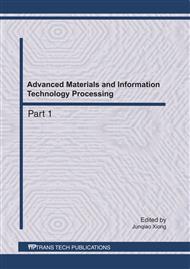p.833
p.839
p.844
p.849
p.853
p.857
p.863
p.868
p.872
Research on the Application of Agent in Personalized Information Recommendation System
Abstract:
In daily life, we rely on other people's suggestions or by word of mouth or recommendation letters and book reviews printed in newspapers and general surveys, such as restaurant guides. However, the Internet's explosive growth has brought us information that anyone can be greatly difficult to digest. To cope with the flood of information, the personalized recommendation systems have been established to assist and complement the natural social process. These systems recommend users to select information that users may be interested in and filter out which users may not be interested. In order to alleviate the information overload problem, the author researches on the application of agent in personalized information recommendation system. The system collects user information of interest through the agent systems and queries the resources to filter and remove information that users do not need. It can provide users with intelligent and active information services.
Info:
Periodical:
Pages:
853-856
Citation:
Online since:
July 2011
Authors:
Price:
Сopyright:
© 2011 Trans Tech Publications Ltd. All Rights Reserved
Share:
Citation:


